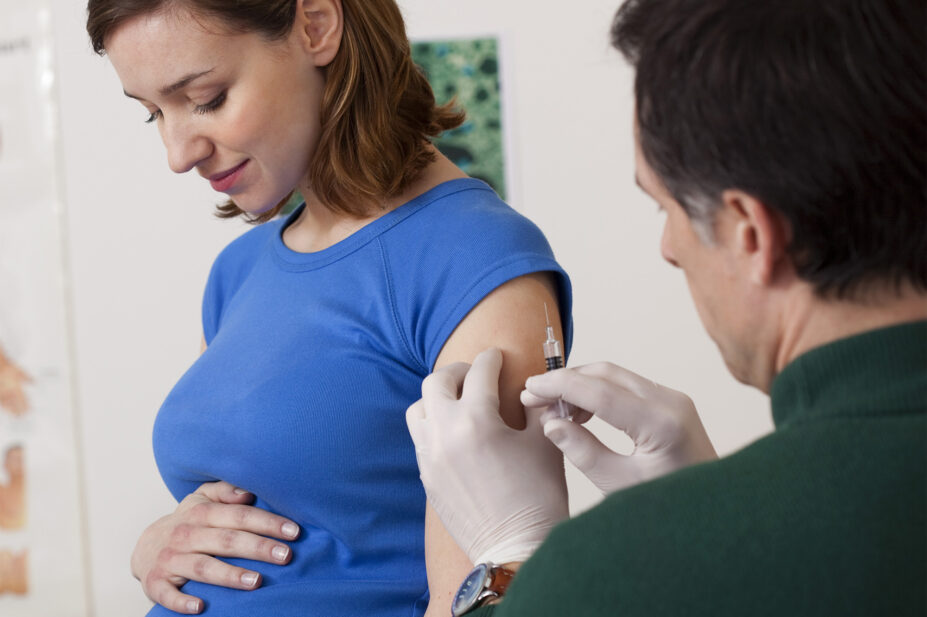
Shutterstock.com
After reading this article you should:
- Be familiar with current UK vaccination recommendations for pregnant patients;
- Understand the rationale for vaccines used during pregnancy;
- Have an awareness of factors leading to vaccine hesitancy in this patient group and how they can be addressed.
Maternal vaccination is an established method of reducing maternal, foetal and infant risk from vaccine-preventable diseases. Throughout the course of a healthy pregnancy, significant immune adaptations occur to provide protection against pathogens and avoid a detrimental maternal immune response towards the foetus1. In combination with decreased lung capacity and increased cardiac output associated with pregnancy, the risk of severe disease and complications from certain infections — such as influenza (flu) — is increased2,3.
Vaccination reduces maternal risk but also confers infant protection from disease in the vulnerable period following birth while the immune system continues to develop and this period is prior to the age at which the infant is eligible to receive their own vaccinations4.
An example that highlights the importance of maternal vaccination is the pertussis vaccine. It is highly effective in preventing infant death, but vaccination rates have fallen in recent years by almost 12% from 70.5% in 2019/2020 to 58.6% in 2023/20245. The UK observed an increase in pertussis cases from late 2023, with 13,952 laboratory confirmed cases from January to September 2024 in England and 10 infant deaths6. In Scotland, there were 6,600 pertussis cases between January and September 20247. Data from the UK Health Security Agency (UKHSA), published in October 2024, has demonstrated the first increase in maternal pertussis vaccination rates since 2019/20208. Mean uptake rates of 59.6% have been reported for the first quarter of 2024/2025, but this is still representative of an 8% decline compared to 2016/2017 and coverage is as low as 41.3% in some regions8. More information about pertussis can be seen below.
It is crucial that healthcare professionals are well informed and able to promote maternal vaccination at every opportunity. Pharmacists are likely to interact with pregnant women in a variety of settings — for example, a pregnant woman buying antenatal vitamins in community pharmacy or taking a medication history from a pregnant woman on a ward. Pharmacists can use these opportunities to:
- Recommend and support vaccination programmes;
- Provide education and reassurance to patients;
- Carry out vaccinations.
Maternal vaccine recommendations
In the UK, the Joint Committee on Vaccination and Immunisation (JCVI) provides recommendations to UK health departments on vaccination programmes. The JCVI is a statutory and advisory body, formed of independent experts whose role is to consider vaccine safety, efficacy and cost-effectiveness9. Currently, women in the UK are offered vaccinations during each pregnancy for pertussis, respiratory syncytial virus (RSV) — introduced in September 202410 — COVID-19 and influenza (flu), in line with JCVI recommendations.
Flu and COVID-19 vaccines are currently offered as part of the national autumn/winter vaccination programme and can be given at any stage of pregnancy during the seasonal campaign11,12. Pregnant patients should be encouraged to receive the flu vaccine as early in the programme as possible, particularly if they are approaching term13. Patients should be individually assessed for vaccine suitability and individual manufacturers’ information should be considered. Contraindications include previous hypersensitivity reactions to the active vaccination substance or to another component or excipient of the vaccine, but generally there are very few patients to whom vaccination is contraindicated14. Live vaccines are not used as part of the maternal vaccination programme. The COVID-19 vaccination is currently offered as an mRNA vaccine, and flu, pertussis and RSV vaccines are inactivated. Following administration, these vaccines cannot cause infection to the pregnant patient or foetus and there are no known risks of vaccinating with inactivated virus, bacterial vaccines or toxoids during pregnancy or breastfeeding14,15.
Following maternal vaccination, infant protection occurs passively, largely via placental transfer of antibodies. Additional protection may also be provided by lactational transfer of antibodies in breastfeeding and indirectly by reducing the risk of maternal infection, which is subsequently passed to the infant16,17.
The details of pertussis and RSV vaccinations can be seen in Table 116,17.
*Note pertussis vaccine is not available as a single product and so it is given via a combination product (Tdap: tetanus, diphtheria, acellular pertussis)
Additional detail on the rationale for each of the recommended vaccines can be seen in the following sections.
Flu
The flu vaccine is recommended for pregnant women because there is a greater risk of severe symptoms or complications (e.g. bronchitis or pneumonia) when flu is contracted during pregnancy, and also because pregnant women with flu are seven times more likely to require hospitalisation than non-pregnant patients18. Risks are further increased for Black and Asian women, women aged over 35 years, and those with underlying health conditions (including asthma, obesity, diabetes mellitus, adrenal insufficiency or chronic liver, kidney or heart disease) 11,19,20. Flu can impact pregnancy outcomes and is associated with an increased risk of late pregnancy loss, prematurity and smaller infant size at birth21.
COVID-19
The understanding and impacts of COVID-19 on pregnant woman and pregnancy outcomes evolved throughout the course of the COVID-19 pandemic and according to the dominant coronavirus strain in circulation. At the height of the COVID-19 pandemic, pregnant women with COVID-19 were at greater risk of intensive care admission and of requiring mechanical ventilation than non-pregnant women. Pregnant women with COVID-19 were also at an increased risk of adverse pregnancy outcomes, including pre-term birth, caesarean delivery and low infant birth weight22. It is now recognised that the risk of severe COVID-19 in pregnancy and in neonates is lower than seen in earlier stages of the COVID-19 pandemic, but emerging viral strains are unpredictable, and ongoing surveillance and routine offer of vaccination has continued up to and including the 2024 autumn winter national vaccination programme23,24.
In November 2024, JCVI announced revised COVID-19 vaccination guidance, which highlighted that there had been no deaths of pregnant woman from COVID-19 infection in the previous 18 months and the risk of hospitalisation had reduced significantly25. As a result, from spring 2025 it will no longer be recommended for immunocompetent pregnant woman to be routinely offered vaccination against COVID-1925.
Pertussis
Pertussis is a highly communicable respiratory infection caused by Bortedella pertussis bacterium. Pertussis can have serious complications, including pneumonia, apnoea and seizures26. Infants aged under six months are at higher risk of severe disease, hospitalisation and even death16. Globally, pertussis outbreaks are cyclical and usually occur every three to five years27. The maternal pertussis vaccination programme was introduced in response to the 2012 pertussis outbreak, in which 10,000 laboratory confirmed cases and 14 infant deaths were recorded in the UK28. Maternal vaccination was introduced to offer protection to infants before they are eligible to receive their own immunisations at eight weeks of age. Since its introduction, the programme has been shown to be highly effective, with a calculated effectiveness of preventing infant death at a rate of 92%16. Maternal pertussis vaccination became part of the routine vaccination programme from 2019 following this demonstration of high vaccine effectiveness, reduced pertussis case numbers and reduced rates of hospitalisation in infants aged under three months29.
Respiratory syncytial virus
From September 2024, pregnant patients are offered the RSV vaccine from 28 weeks gestation10. RSV is a common cause of respiratory tract infection in children, usually causing mild self-limiting symptoms. Infants are at greater risk of acute lower respiratory tract infection, including bronchiolitis, and are at greater risk of severe disease. Infants born prematurely and those with pre-existing or multiple pre-existing diseases (including cardiac or central nervous system anomalies, chromosomal abnormalities or immunodeficiency) are at greatest risk30,31. RSV infection is a major contributory factor to winter pressures on the NHS and accounts for around 33,500 hospital admissions in children aged under five years old and 20 to 30 infant deaths annually32. RSV vaccination has been shown in clinical trials to be 70% effective at preventing severe RSV infection in infants born to vaccinated mothers for the first six months of life or longer. It is also estimated that the programme will prevent 5,000 infant RSV-related hospitalisations and 200 infant intensive care admissions annually33.
Vaccine hesitancy
Despite the clear benefits, maternal vaccination uptake is falling and vaccine hesitancy remains high, which poses a significant public health challenge34–36. Uptake is non-uniform across the country and varies according to region and ethnicity. In 2023/2024, uptake was lowest in Black or Black British Caribbean women at 29.9%8. Flu vaccination uptake, as recorded by GP practices in England, is also falling annually. The 2023/2024 flu season had the lowest maternal vaccination uptake recorded since 201137.
The decrease in pertussis and flu vaccine uptake can be seen in Table 2 7,8,29,38.
Vaccine hesitancy refers to the delay or refusal of safe vaccines despite access and is more commonly reported in pregnant and lactating woman than in the general population38. The major contributory factors towards vaccine hesitancy in pregnancy include:
- Fear of side effects;
- Low confidence in vaccine safety;
- Low perception of disease risk39.
Vaccine acceptance in pregnancy appears more closely linked to maternal concerns for the infants’ health, with expectant mothers feeling the baby is more at risk than themselves34. Maternal vaccination hesitancy intensified during the COVID-19 pandemic when many patients held beliefs that vaccinations had been approved too quickly, with an initial lack of trial data in pregnant patients35. Additional information on vaccine hesitancy in the context of COVID-19 can be found in ‘How to address vaccine hesitancy‘.
The role of the healthcare professional in vaccination uptake is significant. It is well documented that pregnant patients are more likely to attend for vaccination following recommendation by a healthcare professional and this can be the strongest influence in a patient’s decision35,40. Healthcare professionals not taking the time to explain risks and benefits of the vaccine to a patient is seen as a barrier to uptake, as well as conflicting advice received from healthcare professionals, judgemental attitudes or patients feeling pressurised to be vaccinated41. Healthcare professional recommendations may still be outweighed by fears of vaccination safety and misinformation accessed online or via social media42.
Accepting vaccination while pregnant can be a difficult and emotive decision for patients, with many pregnant patients more aware and concerned for foetal and infant protection rather than risks to their own health from vaccine preventable diseases. It is vital for pharmacists and all healthcare professionals to understand the feelings of anxiety pregnant patients may experience relating to vaccination, the importance of personal interactions and the need to build open and trusting relationships with pregnant patients.
Pharmacists should also have an awareness and give attention to patient groups who may be less likely to accept maternal vaccination — including first-time mothers, younger patients, those with lower education and socioeconomic status and those from minority ethnic backgrounds39. As pregnant women of ethnic minorities may be less likely to attend for vaccination, cultural or language barriers should also be considered in patient consultations43.
Consultation tips40,43–46
- Be prepared and be proactive:
- Go further than simply making the recommendation – engage patients in a dialogue and be prepared to have a full discussion on the risks and benefits;
- Use promotional materials to supplement rather than replace personalised conversation;
- Acknowledge the patient’s feelings:
- Explain that ‘it’s natural to worry when making these decisions’;
- Tailor discussion to the individual:
- Respond to the patient’s specific concerns — without introducing new ones;
- Focus on the positives:
- Avoid fear mongering — explain the safety profile and benefits of vaccination, especially those for the baby — ‘vaccination is the safest and most effective way to protect your baby from serious illness’;
- Be aware of language barriers:
- Use an interpreter where available;
- Keep speech clear and jargon-free;
- Have materials available in different languages;
- Check for understanding;
- Peer influence can be an important factor:
- Involve partners and family members with patient consent and where appropriate;
- Avoid judgemental attitudes. Have an open-door policy — particularly for those who decide not to have their vaccinations — “I’m happy to help any time if you have any other questions”.
Best practice
- View pregnant women’s health holistically and use every encounter as an opportunity to engage in a conversation on maternal vaccination;
- Be aware of the patient groups who may require further engagement — go beyond simply supplying a leaflet;
- Respect women’s choice and have an open-door policy.
- This article was amended on 9 December 2024 to include updated JCVI guidance and to clarify wording
- 1.Abu-Raya B, Michalski C, Sadarangani M, Lavoie PM. Maternal Immunological Adaptation During Normal Pregnancy. Front Immunol. 2020;11. doi:10.3389/fimmu.2020.575197
- 2.Yudin M. Risk management of seasonal influenza during pregnancy: current perspectives. IJWH. Published online July 2014:681. doi:10.2147/ijwh.s47235
- 3.Levitus M, Shainker SA, Colvin M. COVID-19 in the Critically Ill Pregnant Patient. Critical Care Clinics. 2022;38(3):521-534. doi:10.1016/j.ccc.2022.01.003
- 4.Cinicola B, Conti MG, Terrin G, et al. The Protective Role of Maternal Immunization in Early Life. Front Pediatr. 2021;9. doi:10.3389/fped.2021.638871
- 5.Prenatal pertussis vaccination coverage in England from January to March 2024. UK Health Security Agency. October 10, 2024. https://www.gov.uk/government/publications/pertussis-immunisation-in-pregnancy-vaccine-coverage-estimates-in-england-october-2013-to-march-2014/prenatal-pertussis-vaccination-coverage-in-england-from-january-to-march-2024-and-annual-coverage-for-2023-to-2024
- 6.Confirmed cases of pertussis in England by month. UK Health Security Agency. November 8, 2024. https://www.gov.uk/government/publications/pertussis-epidemiology-in-england-2024/confirmed-cases-of-pertussis-in-england-by-month
- 7.Immunisation and vaccine-preventable diseases quarterly report. Public Health Security Agency. September 3, 2024. https://publichealthscotland.scot/publications/immunisation-and-vaccine-preventable-diseases-quarterly-report/immunisation-and-vaccine-preventable-diseases-quarterly-report-april-to-june-2024-q2/#section-2
- 8.Prenatal pertussis vaccination coverage in England from April to June 2024. UK Health Security Agency. October 10, 2024. https://www.gov.uk/government/publications/pertussis-immunisation-in-pregnancy-vaccine-coverage-estimates-in-england-october-2013-to-march-2014/prenatal-pertussis-vaccination-coverage-in-england-from-april-to-june-2024#:~:text=Overall%2C%20monthly%20prenatal%20pertussis%20vaccine,ICB%20was%2054.5%20percentage%20points.20
- 9.The roles of the MHRA and JCVI in COVID-19 vaccines. UK Health Security Agency. December 2, 2020. https://ukhsa.blog.gov.uk/2020/12/02/the-roles-of-the-mhra-and-jcvi-in-covid-19-vaccines/
- 10.National RSV vaccination programme announced. Department of Health and Social Care. July 17, 2024. https://www.gov.uk/government/news/national-rsv-vaccination-programme-announced
- 11.Pregnancy and the flu vaccine. NHS Inform. November 5, 2024. https://www.nhsinform.scot/healthy-living/pregnancy-and-the-flu-vaccine
- 12.Pregnancy and the coronavirus vaccines. NHS Inform. September 17, 2024. https://www.nhsinform.scot/covid-19-vaccine/pregnancy-and-the-coronavirus-vaccines
- 13.The flu jab in pregnancy. NHS. September 5, 2022. https://www.nhs.uk/pregnancy/keeping-well/flu-jab/#:~:text=Studies%20have%20shown%20that%20it’s%20safe%20to%20have%20a%20flu
- 14.Chapter 6 – Contraindications and Special Considerations. UK Health Security Agency. August 2017. https://assets.publishing.service.gov.uk/media/5a82ce28e5274a2e8ab5970f/Greenbook_chapter_6.pdf
- 15.Savoy ML. Respiratory Syncytial Virus (RSV) Vaccine. MSD Manual. April 2024. https://www.msdmanuals.com/professional/infectious-diseases/immunization/respiratory-syncytial-virus-rsv-vaccine
- 16.Chapter 24 – Pertussis. UK Health Security Agency. June 26, 2024. https://assets.publishing.service.gov.uk/media/667dee0bc7f64e2342090116/Green_Book_Chapter_24_260624.pdf
- 17.Chapter 27a – RSV. UK Health Security Agency. September 30, 2024. https://assets.publishing.service.gov.uk/media/66fbe7693b919067bb482a1b/Green_Book_Chapter_27a_RSV_30_9_24.pdf
- 18.Mertz D, Lo CKF, Lytvyn L, Ortiz JR, Loeb M. Pregnancy as a risk factor for severe influenza infection: an individual participant data meta-analysis. BMC Infect Dis. 2019;19(1). doi:10.1186/s12879-019-4318-3
- 19.Influenza in Pregnancy: Prevention and Treatment. American College of Obstetricians and Gynecologists. February 2024. https://www.acog.org/clinical/clinical-guidance/committee-statement/articles/2024/02/influenza-in-pregnancy-prevention-and-treatment
- 20.Chapter 19 – Influenza. UK Health Security Agency. November 3, 2024. https://assets.publishing.service.gov.uk/media/654cf306014cc90010677371/Green-book-chapter-19-influenza-_3November2023.pdf
- 21.Dawood FS, Kittikraisak W, Patel A, et al. Incidence of influenza during pregnancy and association with pregnancy and perinatal outcomes in three middle-income countries: a multisite prospective longitudinal cohort study. The Lancet Infectious Diseases. 2021;21(1):97-106. doi:10.1016/s1473-3099(20)30592-2
- 22.Xu K, Sun W, Yang S, Liu T, Hou N. The impact of COVID-19 infections on pregnancy outcomes in women. BMC Pregnancy Childbirth. 2024;24(1). doi:10.1186/s12884-024-06767-7
- 23.JCVI statement on the COVID-19 vaccination programme for autumn 2024. Joint Committee on Vaccination and Immunisation. August 2, 2024. https://www.gov.uk/government/publications/covid-19-autumn-2024-vaccination-programme-jcvi-advice-8-april-2024/jcvi-statement-on-the-covid-19-vaccination-programme-for-autumn-2024-8-april-2024
- 24.Engjom HM, Ramakrishnan R, Vousden N, et al. Perinatal outcomes after admission with COVID-19 in pregnancy: a UK national cohort study. Nat Commun. 2024;15(1). doi:10.1038/s41467-024-47181-z
- 25.JCVI statement on COVID-19 vaccination in 2025 and spring 2026. Department of Health and Social Care. November 2024. Accessed December 2024. https://www.gov.uk/government/publications/covid-19-vaccination-in-2025-and-spring-2026-jcvi-advice/jcvi-statement-on-covid-19-vaccination-in-2025-and-spring-2026
- 26.Pertussis; guidance, data and analysis. UK Health Security Agency. July 31, 2014. https://www.gov.uk/government/collections/pertussis-guidance-data-and-analysis
- 27.Venkatesan P. Whooping cough cases rising. The Lancet Respiratory Medicine. 2024;12(8):e50. doi:10.1016/s2213-2600(24)00204-2
- 28.Sealey KL, Harris SR, Fry NK, et al. Genomic Analysis of Isolates From the United Kingdom 2012 Pertussis Outbreak Reveals That Vaccine Antigen Genes Are Unusually Fast Evolving. J Infect Dis. 2014;212(2):294-301. doi:10.1093/infdis/jiu665
- 29.Pertussis (whooping cough) vaccination programme for pregnancy woman: information for healthcare professionals. UK Health Security Agency. August 5, 2024. https://www.gov.uk/government/publications/vaccination-against-pertussis-whooping-cough-for-pregnant-women/pertussis-whooping-cough-vaccination-programme-for-pregnant-women
- 30.Respiratory syncytial virus infection – Symptoms diagnosis and treatment. BMJ Best Practice. October 6, 2021. https://bestpractice.bmj.com/topics/en-gb/28
- 31.Thorburn K. Pre-existing disease is associated with a significantly higher risk of death in severe respiratory syncytial virus infection. Archives of Disease in Childhood. 2008;94(2):99-103. doi:10.1136/adc.2008.139188
- 32.Respiratory syncytial virus (RSV) vaccine immunisation programme for infants and older adults: JCVI full statement. Joint Committee on Vaccination and Immunisation. September 11, 2023. https://www.gov.uk/government/publications/rsv-immunisation-programme-jcvi-advice-7-june-2023/respiratory-syncytial-virus-rsv-immunisation-programme-for-infants-and-older-adults-jcvi-full-statement-11-september-2023#:~:text=JCVI%20recognises%20that%20there%20is%20a%20significant%20burden%20of%20RSV
- 33.Hodgson D, Wilkins N, van Leeuwen E, et al. Protecting infants against RSV disease: an impact and cost-effectiveness comparison of long-acting monoclonal antibodies and maternal vaccination. The Lancet Regional Health – Europe. 2024;38:100829. doi:10.1016/j.lanepe.2023.100829
- 34.Mitchell SL, Schulkin J, Power ML. Vaccine hesitancy in pregnant Women: A narrative review. Vaccine. 2023;41(29):4220-4227. doi:10.1016/j.vaccine.2023.05.047
- 35.Kilada S, French N, Perkins E, Hungerford D. Pregnant women’s attitudes and behaviours towards antenatal vaccination against Influenza and COVID-19 in the Liverpool City Region, United Kingdom: Cross-sectional survey. Vaccine: X. 2023;15:100387. doi:10.1016/j.jvacx.2023.100387
- 36.Kilich E, Dada S, Francis MR, et al. Factors that influence vaccination decision-making among pregnant women: A systematic review and meta-analysis. Borrow R, ed. PLoS ONE. 2020;15(7):e0234827. doi:10.1371/journal.pone.0234827
- 37.Seasonal influenza vaccine uptake in GP patients in England: winter season 2023-2024. UK Health Security Agency. May 23, 2024. https://www.gov.uk/government/statistics/seasonal-influenza-vaccine-uptake-in-gp-patients-winter-season-2023-to-2024/seasonal-influenza-vaccine-uptake-in-gp-patients-in-england-winter-season-2023-to-2024
- 38.Seasonal influenza vaccine uptake in GP patients: winter season 2019 to 2020. Public Health England. June 25, 2020. https://assets.publishing.service.gov.uk/media/5f463c62d3bf7f69aa3bf772/Annual-Report_SeasonalFlu-Vaccine_GPs_2019-20_FINAL_amended.pdf#:~:text=Cumulative%20influenza%20vaccine%20uptake%20in%20GP%20registered%20patients%20from%201
- 39.De Brabandere L, Hendrickx G, Poels K, Daelemans W, Van Damme P, Maertens K. Influence of the COVID-19 pandemic and social media on the behaviour of pregnant and lactating women towards vaccination: a scoping review. BMJ Open. 2023;13(2):e066367. doi:10.1136/bmjopen-2022-066367
- 40.Sebghati M, Khalil A. Uptake of vaccination in pregnancy. Best Practice & Research Clinical Obstetrics & Gynaecology. 2021;76:53-65. doi:10.1016/j.bpobgyn.2021.03.007
- 41.Geoghegan S, Shuster S, Butler KM, Feemster KA. Understanding Barriers and Facilitators to Maternal Immunization: A Systematic Narrative Synthesis of the Published Literature. Matern Child Health J. 2022;26(11):2198-2209. doi:10.1007/s10995-022-03508-0
- 42.Wilcox CR, Little P, Jones CE. Current practice and attitudes towards vaccination during pregnancy: a survey of GPs across England. Br J Gen Pract. 2020;70(692):e179-e185. doi:10.3399/bjgp20x708113
- 43.Wilson R, Paterson P, Larson HJ. Strategies to improve maternal vaccination acceptance. BMC Public Health. 2019;19(1). doi:10.1186/s12889-019-6655-y
- 44.Gunkaya OS, Tekin AB, Yassa M, et al. Pregnant women’s knowledge about and beliefs toward COVID-19 vaccine: a cross-sectional study. Clin Exp Vaccine Res. 2023;12(2):134. doi:10.7774/cevr.2023.12.2.134
- 45.Wilcox CR, Calvert A, Metz J, et al. Determinants of Influenza and Pertussis Vaccination Uptake in Pregnancy. Pediatric Infectious Disease Journal. 2019;38(6):625-630. doi:10.1097/inf.0000000000002242
- 46.Rand CM, Olson-Chen C. Maternal Vaccination and Vaccine Hesitancy. Pediatric Clinics of North America. 2023;70(2):259-269. doi:10.1016/j.pcl.2022.11.004


